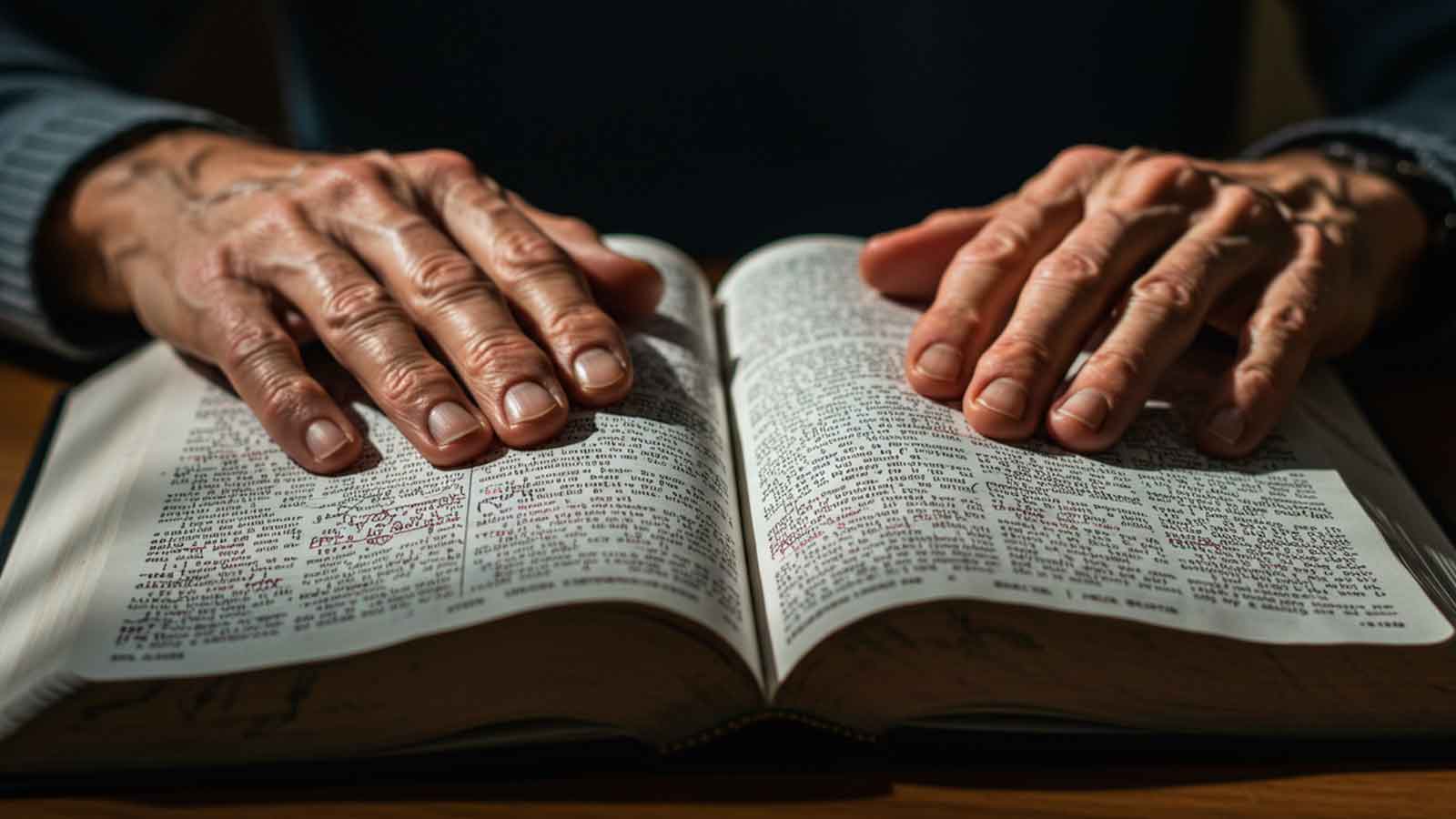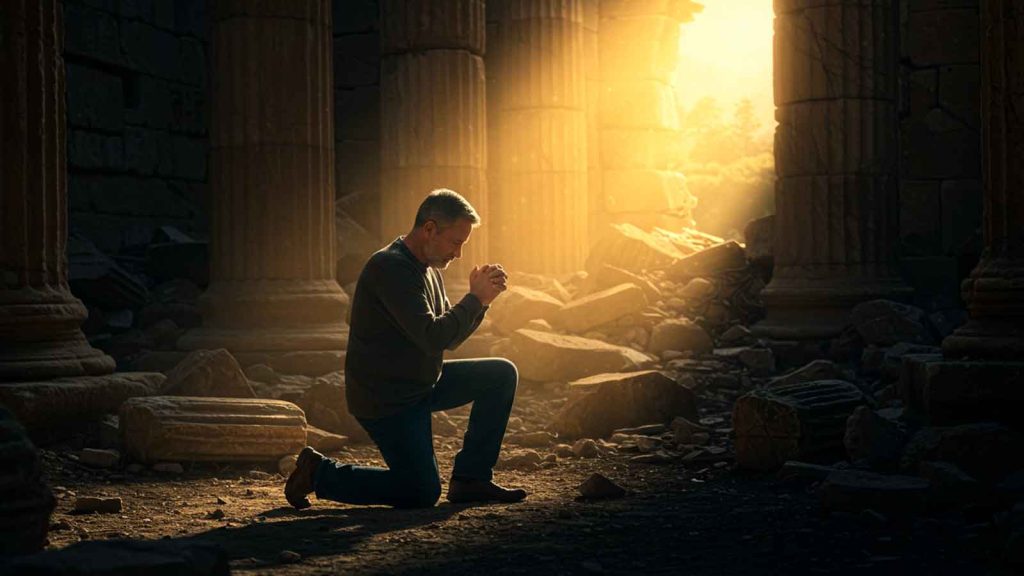The Psalm 102 is one of the most moving passages in the book of Psalms. From the very first lines we are led into the heartfelt cry of a soul in anguish. The presence of language of pain, supplication, and hope makes Psalm 102 a timeless prayer that speaks to the hearts of all who face difficult seasons.
In this article we will explore the background, verses, and spiritual messages contained in Psalm 102, reflecting on what it can mean for today’s reader. We will also analyze the psalm verse by verse, highlight related words such as prayer, cry, trust, and redemption, and answer common questions about this passage.

Psalm 102 in Full
¹ Lord, hear my prayer, and let my cry come before you.
² Do not hide your face from me in the day of my distress; incline your ear to me; on the day I call, answer me quickly.
³ For my days vanish like smoke, and my bones burn like firewood.
⁴ My heart is stricken and withered like grass, so that I forget to eat my bread.
⁵ Because of the sound of my groaning my bones cling to my flesh.
⁶ I am like a pelican in the wilderness; I am like an owl among the ruins.
⁷ I keep watch and am like a lonely sparrow on the housetop.
⁸ My enemies taunt me all day long; those who rage against me use my name as a curse.
⁹ For I eat ashes like bread and mingle my drink with tears
¹⁰ because of your indignation and your wrath, for you have lifted me up and thrown me aside.
¹¹ My days are like a lengthening shadow, and I wither away like grass.
¹² But you, Lord, sit enthroned forever; your remembrance endures through all generations.
¹³ You will arise and have compassion on Zion, for it is time to show favor to her—the appointed time has come.
¹⁴ For your servants cherish her stones and have pity on her dust.
¹⁵ Then the nations will fear the name of the Lord, and all the kings of the earth your glory.
¹⁶ For the Lord will rebuild Zion and appear in his glory.
¹⁷ He will respond to the prayer of the destitute; he will not despise their plea.
¹⁸ Let this be written for a future generation, that a people yet to be created may praise the Lord.
¹⁹ For he looked down from the height of his sanctuary; from heaven the Lord viewed the earth
²⁰ to hear the groans of the prisoners and release those condemned to death;
²¹ so that they may declare the name of the Lord in Zion and his praise in Jerusalem
²² when the peoples and the kingdoms assemble to serve the Lord.
²³ He has broken my strength in mid-course; he has shortened my days.
²⁴ I said, “My God, do not take me away in the midst of my days; your years endure through all generations.”
²⁵ In the beginning you laid the foundations of the earth, and the heavens are the work of your hands.
²⁶ They will perish, but you remain; they will all wear out like a garment. Like clothing you will change them, and they will be changed.
²⁷ But you are the same, and your years will have no end.
²⁸ The children of your servants will continue, and their descendants will be established before you.

Explanation of Psalm 102
Psalm 102:1
“Lord, hear my prayer, and let my cry come before you.”
The psalmist begins with a direct plea—an urgent cry asking God to listen. This verse reveals an afflicted heart desperately seeking a divine answer.
Psalm 102:2
“Do not hide your face from me in the day of my distress; incline your ear to me; on the day I call, answer me quickly.”
The plea intensifies. The psalmist not only wants to be heard but also wants a swift response, fearing God’s silence.
Psalm 102:3
“For my days vanish like smoke, and my bones burn like firewood.”
He describes his life as something that dissipates. The image of smoke conveys frailty, and burning bones suggest intense physical pain.
Psalm 102:4
“My heart is stricken and withered like grass, so that I forget to eat my bread.”
The emotional pain is so deep that he loses his appetite. A heart withered like grass depicts a soul drained of strength and hope.
Psalm 102:5
“Because of the sound of my groaning my bones cling to my flesh.”
The suffering is physically visible. Extreme thinness reflects the weight of constant groaning, revealing grief that consumes.
Psalm 102:6
“I am like a pelican in the wilderness; I am like an owl among the ruins.”
He compares himself to solitary animals in desolate places, portraying feelings of abandonment and isolation.
Psalm 102:7
“I keep watch and am like a lonely sparrow on the housetop.”
The psalmist is always on guard, sleepless. The rooftop sparrow represents someone who watches from afar—alone, without shelter or company.
Psalm 102:8
“My enemies taunt me all day long; those who rage against me use my name as a curse.”
Beyond internal pain, there is external oppression. He suffers continuous attacks from enemies who slander and conspire against him.
Psalm 102:9
“For I eat ashes like bread and mingle my drink with tears,”
Sorrow is so great that it affects the simplest moments of life. Ashes in his bread and tears in his drink mark a daily routine of grief and despair.
Psalm 102:10
“because of your indignation and your wrath, for you have lifted me up and thrown me aside.”
The psalmist interprets his suffering as a result of God’s anger. He feels he was raised up only to be cast down in rejection.
Psalm 102:11
“My days are like a lengthening shadow, and I wither away like grass.”
Once more he underscores life’s fleeting nature. The fading shadow and withering grass symbolize bodily and spiritual decline.
Psalm 102:12
“But you, Lord, sit enthroned forever; your remembrance endures through all generations.”
This verse marks the transition from lament to faith. The psalmist acknowledges God’s eternity in contrast to his own transience.
Psalm 102:13
“You will arise and have compassion on Zion; for it is time to show favor to her—the appointed time has come.”
Hope for restoration arises. He believes the moment has arrived for God to have mercy on Jerusalem and intervene for his people.
Psalm 102:14
“For your servants cherish her stones and have pity on her dust.”
Even in ruins, Jerusalem is loved by God’s servants, revealing deep affection for the place of divine presence.
Psalm 102:15
“Then the nations will fear the name of the Lord, and all the kings of the earth your glory.”
When God restores Zion, his glory will be so evident that even the nations will acknowledge his power and majesty.
Psalm 102:16
“For the Lord will rebuild Zion and appear in his glory.”
The rebuilding of Zion will be accompanied by the visible manifestation of divine glory—a promise of renewal and glorious presence.
Psalm 102:17
“He will respond to the prayer of the destitute; he will not despise their plea.”
God is sensitive to the cry of the lonely. The psalmist declares that the Lord does not ignore sincere prayer.
Psalm 102:18
“Let this be written for a future generation, that a people yet to be created may praise the Lord.”
The present experience will become a testimony for future generations; praise will rise for God’s works yet to come.
Psalm 102:19
“For he looked down from the height of his sanctuary; from heaven the Lord viewed the earth,”
God, in his greatness, looks upon the earth. He sees and cares about what happens to his people.
Psalm 102:20
“to hear the groans of the prisoners and release those condemned to death;”
His attention turns toward the oppressed. He hears and frees those in desperate, life-threatening situations.
Psalm 102:21
“so that they may declare the name of the Lord in Zion and his praise in Jerusalem,”
The purpose of liberation is praise. God acts so that his name might be exalted among his people.
Psalm 102:22
“when the peoples and the kingdoms assemble to serve the Lord.”
The vision expands: not only Israel but all nations will gather in worship of the Lord.
Psalm 102:23
“He has broken my strength in mid-course; he has shortened my days.”
The psalmist returns to a personal tone. He feels weak, as though his life is being shortened by so much suffering.
Psalm 102:24
“I said, ‘My God, do not take me away in the midst of my days; your years endure through all generations.’”
It is a plea for more time. He recognizes that, unlike fleeting humanity, God exists eternally.
Psalm 102:25
“In the beginning you laid the foundations of the earth, and the heavens are the work of your hands.”
God is the Creator. The stability of creation reinforces trust in God’s eternal power.
Psalm 102:26
“They will perish, but you remain; they will all wear out like a garment. Like clothing you will change them, and they will be changed.”
Even heaven and earth are temporary before God. Everything passes away—except him.
Psalm 102:27
“But you are the same, and your years will have no end.”
One of the strongest affirmations of God’s immutability—he is eternal, stable, and trustworthy.
Psalm 102:28
“The children of your servants will continue, and their descendants will be established before you.”
The psalm ends with hope: God’s faithfulness will extend to future generations; there is a secure future for all who serve him.
The Context of Psalm 102
Psalm 102 opens with a moving introduction: “A prayer of an afflicted person when they are faint and pour out their lament before the Lord.” This tells us much about its purpose: it is not a typical psalm of praise or celebration but a sincere record of despair and faith.
This psalm is attributed to an unnamed author, possibly a prophet or servant of God in the midst of exile. Many scholars believe it was written during the Babylonian captivity, when the people of Israel longed for redemption and restoration.
The structure of Psalm 102 is unique because it moves from individual sorrow to collective hope. It is a personal prayer that broadens into intercession for the people.
The Agonies of a Troubled Heart
The psalmist’s cry reveals a deeply anguished heart. He describes his life as a fading shadow, as grass that withers. Words like loneliness, ashes, groaning, and tears fill the opening verses.
These expressions reflect a soul that feels forgotten and rejected yet still seeks comfort in God. Thus, Psalm 102 is a faithful portrait of the human condition in suffering.
This part of the psalm is especially relevant for anyone who has faced moments of discouragement, sadness, or despair. Even without all the answers, the psalmist turns to God and expresses his pain in prayer.
The Shift to Hope
Amid the lament, a crucial turning point occurs in Psalm 102. The author declares, “But you, Lord, sit enthroned forever…” This change of tone is essential: out of affliction arises confidence.
Suddenly the personal pain gives way to collective faith. He speaks of the restoration of Zion, God’s favor toward his people, and the promise that future generations will praise him.
This transition shows that even in difficult times, faith can reorient our perspective. Psalm 102 teaches us that we are not defined solely by the pain we feel but also by the hope we cultivate.

Verses Explained from Psalm 102
Psalm 102:1
“Hear my prayer, Lord, and let my cry come before you.”
The psalmist pleads for his prayer to be heard, recognizing that only God can answer his suffering.
Psalm 102:2
“Do not hide your face from me in the day of my distress…”
A request for divine attention, as the afflicted heart pleads not to be ignored.
Psalm 102:3
“For my days vanish like smoke…”
Here the psalmist uses the smoke metaphor to describe life’s brevity.
Psalm 102:12
“But you, Lord, sit enthroned forever…”
Hope begins to shine—God is eternal, and his faithfulness never fails.
Psalm 102:17
“He will respond to the prayer of the destitute and not despise their plea.”
A comforting promise: God hears the afflicted.
Psalm 102:25
“In the beginning you laid the foundations of the earth, and the heavens are the work of your hands.”
A declaration of faith in God’s creative power.
Spiritual Lessons from Psalm 102
- Sincere prayer has value – Even when we lack eloquent words, God hears the cry of a broken heart.
- God is eternal; we are not – By recognizing our frailty we can trust more deeply in God’s strength.
- Hope for future generations – The psalmist believes that restoration will reach children and grandchildren as well.
When to Use Psalm 102 in Your Life
Many people turn to Psalm 102 in times of:
- Grief or loss;
- Spiritual discouragement;
- Emotional isolation;
- Uncertainty about the future.
This psalm is a powerful tool for connecting with God when we cannot understand the circumstances around us.
Psalm 102 as a Model of Prayer
Psalm 102 is not merely a record of pain; it is also a model for praying in days of anguish. The psalmist:
- Acknowledges his pain;
- Places his hope in God;
- Prays for himself and for the people;
- Exalts the Lord’s faithfulness.
It is a powerful pattern for anyone seeking a path of faith in difficult times.
God’s Eternity in Contrast with Human Brevity
One of the strongest images in Psalm 102 is the comparison between human brevity and God’s eternity. This teaches us to:
- Value the present;
- Trust in God’s purpose even when we don’t understand it;
- Surrender our frailties to God.
Psalm 102 and the New Testament
Interestingly, parts of Psalm 102 are quoted in the New Testament, especially in Hebrews 1:10-12. This reference confirms the Christian understanding that the psalm points to the eternity of Christ, who remains forever.
Final Reflection on Psalm 102
Psalm 102 is an honest, human, and faith-filled prayer. It teaches us that we can weep in God’s presence, express our pain without fear, and at the same time trust that the Lord remains steadfast even when everything seems to crumble around us.
Its message is not one of despair but of redemption. It begins with a cry and ends with hope—a cycle many know well.
FAQ – Frequently Asked Questions about Psalm 102
What does Psalm 102 mean?
Psalm 102 expresses the pain of an afflicted person who finds hope in God’s eternity and faithfulness. It is an intense prayer acknowledging human frailty and divine sovereignty.
Who wrote Psalm 102?
No author is definitively known, but scholars believe it was composed by someone in deep suffering, possibly during the Babylonian exile.
For which situation is Psalm 102 useful?
It is ideal for moments of anguish, personal prayer, or intercession for collective spiritual and emotional restoration.
What is the main message of Psalm 102?
The main message of Psalm 102 is that God remains faithful even when everything seems uncertain. He hears the cry of the afflicted and promises restoration.
Can I pray using Psalm 102?
Yes. Many people use Psalm 102 as a prayer in times of discouragement, acknowledging their pain while reaffirming trust in the Lord.
READ ALSO:
- 50 Beautiful Verses to Strengthen Faith and the Heart
- Proverbs 15 – Reflections that Transform
- Birthday Message: Biblical Inspiration to Celebrate
FOLLOW US ON FACEBOOK
I hope you enjoyed it